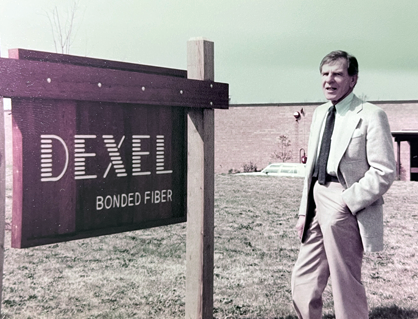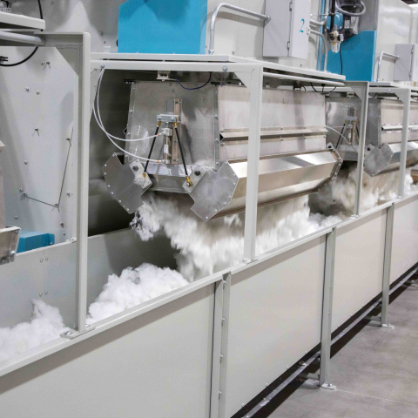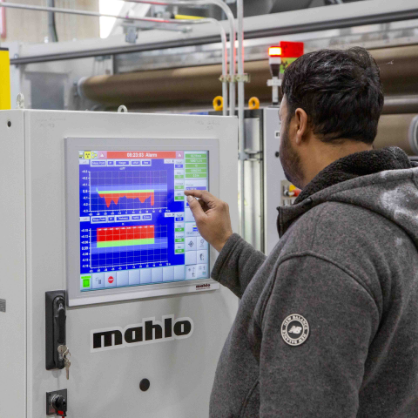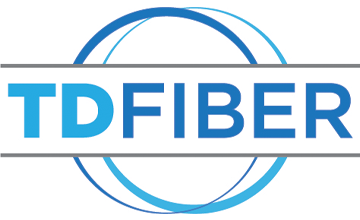
TD Fiber has been manufacturing high-quality fiber products for nearly 100 years, making it one of the longest-operating textile fiber firms in the nation, committed to delivering exceptional quality, innovation and service to customers across a wide variety of industries throughout the U.S.
The company traces its roots to November 1925, when George Lambeth, Ralph Wilson, Susie Wilson and John Myers joined together to form Thomasville Bedding Company in Thomasville, NC.
By the mid-1940s, the leadership of the company had changed to Coy Williard Sr. and Raymond Deal Sr., who promoted the company as a mattress maker and a manufacturer of cotton batting – which soon became its niche. In the next decade, Thomasville Bedding weathered the loss of both leaders, after Deal passed away in January 1954, followed a little more than a month later by Williard.
Raymond Deal Jr., who was in his mid-20s at the time and the company’s sales manager, was named president.

Raymond Deal Jr.
Thomasville Fiber Company:
A New Name, A Move to Polyester
Known for his strong leadership, commitment to innovation and focus on quality, Raymond Deal Jr. would go on to lead the company for more than 50 years, guiding it through periods of major growth and change. One of his early moves was to seek stockholders’ approval to change the name in 1956 to Thomasville Fiber Company, which more accurately reflected the company’s emphasis.
With that change approved, the company focused on the manufacture of high-quality cotton batting, primarily for the furniture and bedding industries. More change came as Deal moved the company from its original location in Thomasville to its present site in the nearby city of High Point, NC.
Then, in the 1960s, a new synthetic material named polyester was introduced to the marketplace. Thomasville Fiber became one of the pioneers in the use of this material that revolutionized the nonwoven industry – and soon polyester became Thomasville Fiber’s focus.

Thomasville-Dexel Incorporated:
Growth and the Addition of Bonded Fiber
In the 1980s, Deal started a new company, Dexel Bonded Fiber, specializing in material produced using a chemical applied to the fabric that was cured in an oven. Initially, Dexel used a thermally activated powder as a binder but then transitioned to polyester with a lower melt-point when it was introduced in the marketplace in the 1990s. Soon, Deal added an oven to the production lines at the Thomasville Fiber plant as well, paving the way for that company to produce thermally bonded fiber in that location as well.
Meanwhile, Thomasville Fiber Company continued to grow, installing three nonwoven production lines and adding converting services to its capabilities in the early 1990s. The addition of converting services enabled customers to receive orders pre-cut to their specifications.
With both of his companies producing similar styles of products, Deal merged Thomasville Fiber Company and Dexel Bonded Fiber on Jan. 1, 1994, changing the company name to Thomasville-Dexel Incorporated.

TD Fiber:
Helping Create Fiber Solutions for Diverse Industries
After Raymond Deal Jr. passed away in 2009, the company transitioned to the current president, Blair Whitworth. In 2016, the company’s name was changed to TD Fiber.
Under Whitworth’s leadership, the company has continued to expand, with a fourth nonwoven production line added in 2018 and a fifth in 2023. Four of the five lines are equipped with needle looms, which can be used in conjunction with thermal bonding to provide additional strength to fabric when needed for certain applications.
Garnetts are used for web formation on four lines while the fifth utilizes a card. The garnetting and carding processes are similar but result in slightly different finished products. A garnetted web has more randomized fibers while one created with a card is more uniform.
Several of the TD Fiber lines include double-belt compression ovens, which enable the production of densified materials useful for a variety of applications, including mattress cores and outdoor furniture cushions. As fabric passes through these ovens, not only is heat generated to melt the polyester, but operators also can adjust the gap between the two belts to compress the fabric to achieve densification.
While it continues to supply premium-quality nonwoven polyester fiber to the bedding and furniture industries, TD Fiber today is a diversified company, producing fabrics for a wide variety of segments, including hygiene, filtration, appliance, packaging and automotive. Customers range from small firms to Fortune 500 corporations.
TD Fiber has two production facilities and a converting operation in High Point. It operates a fleet of trucks and trailers to deliver materials in North Carolina and ships via common carrier throughout the rest of the United States.

